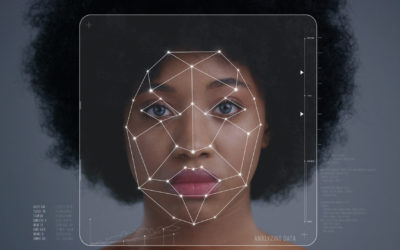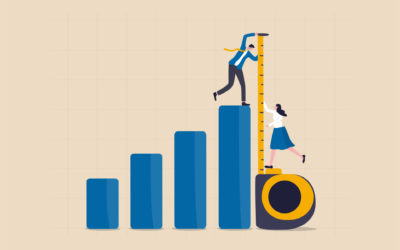What does this mean?
Depending on where a black woman lives and how dark her complexion in comparison to others around her, will determine the levels of prejudices and disadvantages she will face. This brings us back to colorism and its negative effects. White women, and thus all women, are unjustly held against an unfair and unequal ideology of what “true womanhood” should look like. And due to racism and the systems created through it, this has led black women to be compared against the idea of the perfect white woman. Forever locking them in losing the battle of being what even their counterparts struggle to satisfy.
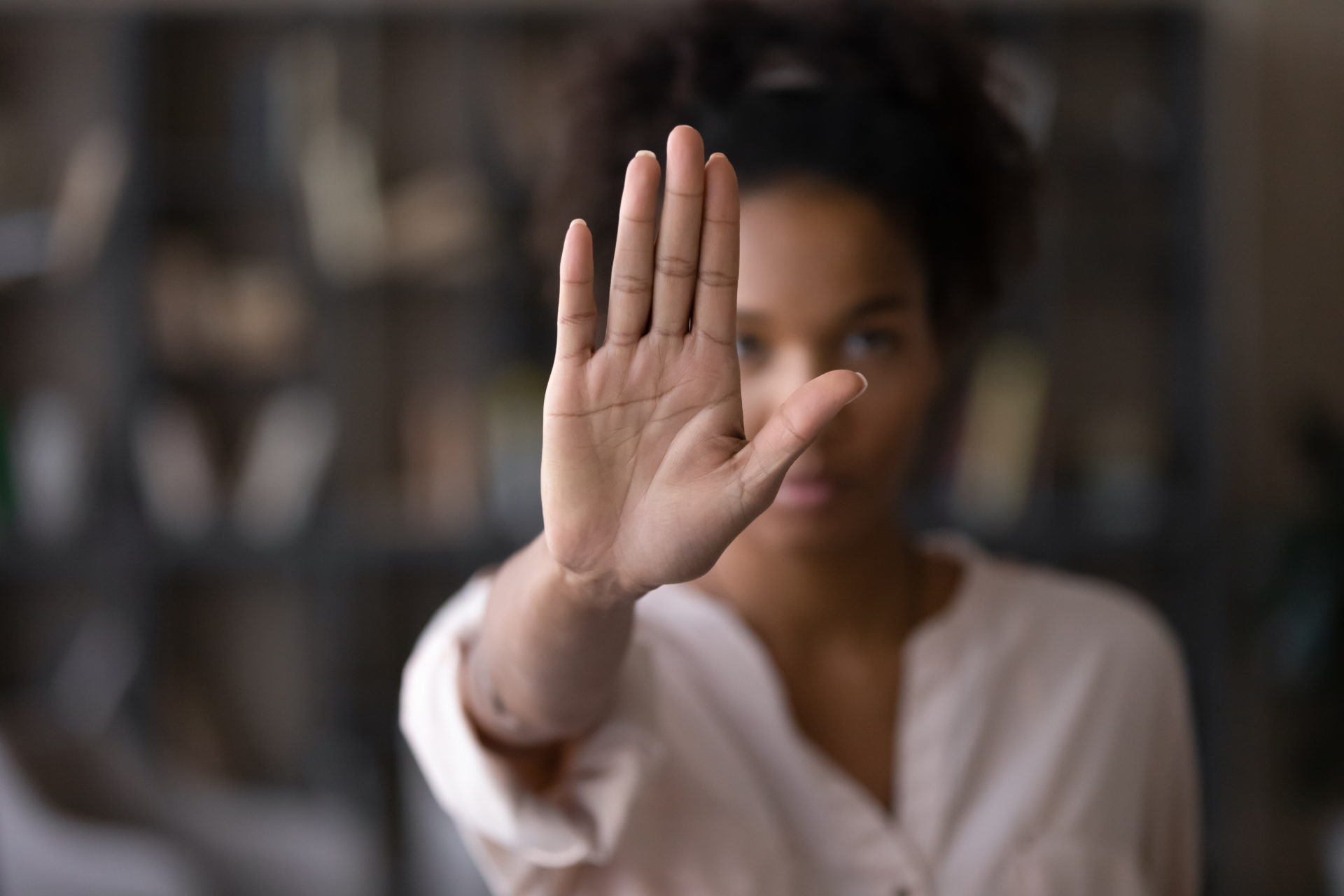
Woman saying “Stop”
“While the efforts to counter stereotypes through respectability were well intentioned they have led to many disadvantages and negative consequences for black women in the US workplace, as well as worldwide.” – Martin Luther King Jr.
As Mahassen Mgadmi said in, Black Women’s Identity: Stereotypes, Respectability and Passionlessness (1890-1930), “black women were conceived and pictured as primitive, lustful, seductive, physically strong, domineering, unwomanly and dirty.” (Revue LISA/LISA e-journal [En ligne] ). How does this translate into modern day society one may be thinking? This has lead to ideas of the blackwoman” being the “inept domestic servant” (the mammy), the domineering matriarch, the sex object (the Jezebel), and the tragic mulatto.” And, let’s not forget the “Sapphire” being the sexy but angry black woman. And with this mentality became the idea that the only good black woman was the ideal figure of the mammy, her being a Superwoman (motherly), less than female, stronger than man, less attractive, and asexual.
Al Jazeera English, has a good discussion on these stereotypes found in media that will help one understand how these are seen in everyday life and how they are portrayed in our media. Mammy, Jezebel and Sapphire: Stereotyping Black women in media | The Listening Post.
In effort to counter stereotypes placed on black women, this marginalized group and others within their community began pushing the idea of being “respectable”, however, this ultimately led to an societal and internalized acceptance of the stereotypes pushed on black women.
Leading to these stereotypes being handed down through the generations becoming unconscious biases and now can be seen in today’s workplaces. While the efforts to counter stereotypes through respectability were well intentioned they have led to many disadvantages and negative consequences for black women in the US workplace, as well as worldwide.

Black woman working with her laptop
In today’s US corporate workplaces black women constantly face challenges of being underrepresented, overlooked, interrupted, and unsupported. (Journal of Black Studies, vol. 43, no. 2, 2012, pp. 207–26. JSTOR.2022). The cause of these challenges directly link to the archetypal stereotypes of “The Angry Black Woman”, the belief of “Intellectual Inferiority”, and the “Superwoman” complex.
1. The “Angry Black Woman”
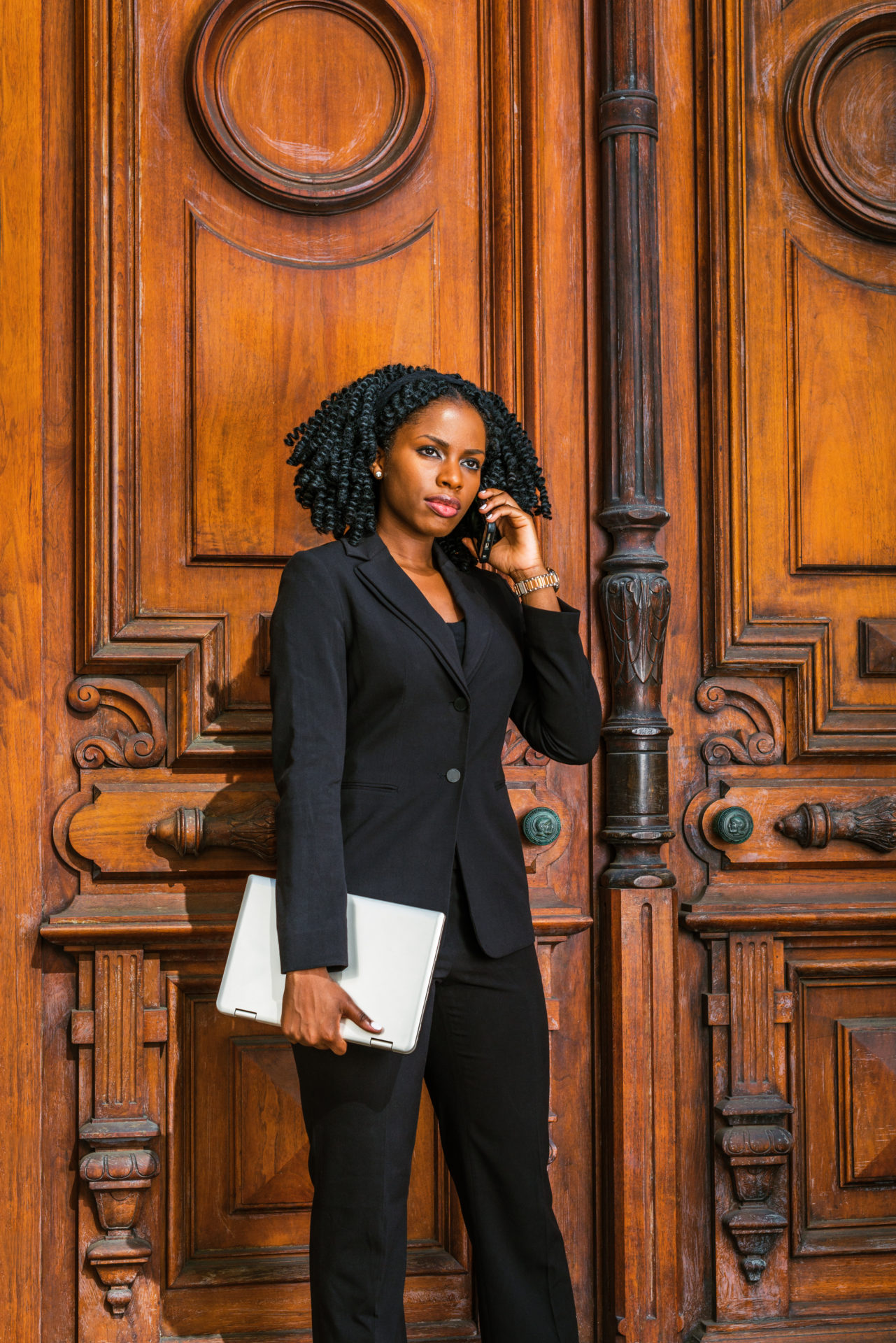
Black woman working
Harvard Business Review, in their article The “Angry Black Woman ” Stereotype at Work, discussed how they decided to conduct an experiment with 300 undergraduate business students. They had them “watch one of eight videos, in which they observed a male supervisor to one of his employees. In each video, there were three factors at play: race, gender, and emotional response of the employee. (The employee was either Black or white, male or female, and angry or neutral.) When the employee was angry, their tone began to increase, eventually shouting and yelling at the supervisor.” (HBR,2022)
This experiment found that “participants were more likely to attribute the anger of Black female employees to internal characteristics, or her personality. This had negative consequences because internal attributions translated into lower performance ratings and leadership evaluations.”(HBR,2022)
This leads to black women in the workplace being unable to disagree or provide alternative solutions without being labeled aggressive or hostile. They regularly report feelings and experiences of isolation at the workplace. See below for a list of further readings on the trope of the “angry black woman”.
2. Incompetent and/or intellectually inferior
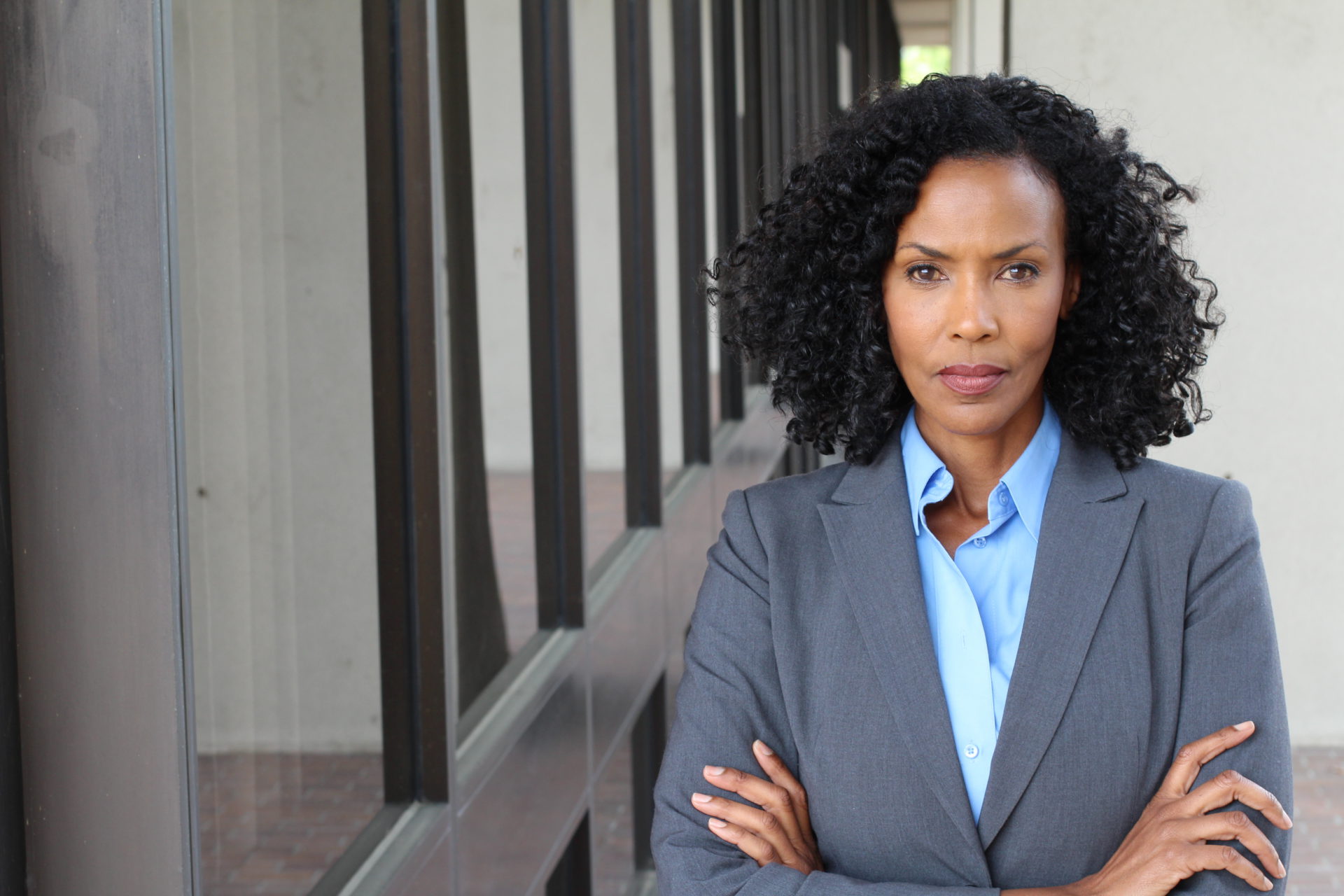
Executive Black woman
Studies have found that it is common practice for Black women to be second guessed, micromanaged, questioned, and watched. This has resulted in others invalidating their beliefs and experiences. Recent studies find those claiming to be allies, claiming to act as champions for Black women, in practice are actually perpetuating the same underline oppressive beliefs and systems they want to help dismantle. Black women find themselves constantly defending their position(s) and having to explain ideas and decisions in their counterparts’ cultural language. This unconscious bias is found at higher rates where there are smaller ratios of other blacks in management and executive positions.
Lean In and McKinsey & Company’s annual Women in the Workplace study, the report, The State of Black Women in Corporate America 2020 (HTML or PDF, 38 pages), found that Black women are far more likely to face day-to-day discrimination at work than men or other women, including others questioning their judgment in their area of expertise (41%) and expressing surprise at their skills or abilities (26%).
“The report also found that 54% of African-American women report often being the only Black person or one of the only Black people in the room at work, and are more likely than men or other women to feel excluded (23%), closely watched (41 percent), under pressure to perform (49%), and as though their actions reflect positively or negatively on all African Americans.”(philanthropynewsdigest, 2022). See below for Further Readings.
3. “Superwoman” or superhuman

Super Black Woman
The Superwoman bias is a tricky one because on first impression it seems like a compliment and is often used for black women. Especially in today’s society where we idealize the concept of superheroes, consider Black Panther and any of the other Marvel movies as examples.
However, the usage of superheroes in context to black women is framed against its original roots of black women being the ideal “Mammy”. Thus in the workplace this leads to black women being overloaded and treated as if they are able to handle anything due to their inhuman abilities. This leads to mistreatment of black women employees who are inundated with heavier workloads than their colleagues and still having to meet the standard of being better than their colleagues due to the also competing unconscious bias that their work is also inferior.
This often leads to them being overlooked for opportunities and for promotion. One thought it is because their accomplishments are not seen as accomplishments but nothing more than expectations of their inhuman abilities. While their counterparts are able to achieve recognition with far less.
Dana Brownlee stated in her Forbes article, “Black women also ranked dead last in their experience of manager support—managers showing interest in their career, checking in on their well-being and promoting inclusion—as compared to other identities including men, all women, LGBTQ women, women with disabilities, white women, Asian women and Latinas.” (Forbes 2022). See below for Further Readings.
What is the Resulting effect?
These stereotypes have created a myriad of unconscious biases in the workplace and are leading the decisions made by the leadership within US companies, and worldwide business leaders. It affects black women (1) being hired or promoted in the workplace, (2) leading to them defending their race and lack of mentorship, (3) requiring them to shift or code switch in order to overcome barriers to employment, (4) coping with racism and discrimination, and (5) them being isolated and/or excluded.
According to the U.S. Bureau of Labor Statistics, Black women make up nearly 7% of the workforce, and are severely underrepresented in leadership positions. Of the current Fortune 500 companies, there are only 2 black women that currently hold the CEO position.
Mckinsey Oct 2022 report found that 80% of women experience microaggressions at work and black women were more likely than not to experience this microaggression than their other counterparts. When this is coupled with Forbes finding that, “55% of Black women leaders experienced having their judgment questioned compared to 39% for all women and 28% for all men,” it is clear that Black women face overwhelming challenges in their career opportunities and growth.
The untapped potential of black women.

Two Black innovative women at work
Companies are losing out on a valuable talent pool due to the unconscious bias being held by their decision makers and in their hiring and retention policies.
Did you know that black women are the fastest growing group of entrepreneurs. “with 17% in the process of starting or running new businesses (versus 10% of white women and 15% of white men), according to research published in Harvard Business Review.”(Fastcompany, 2022). Black women are rapidly and increasingly leaving companies that are mistreating them and many are doing it to start their own establishment. Consider this fact, along with the other that “Black women are enrolled in and graduating from school in the highest percentages across racial and gender lines,( and still) negative depictions of Black women (are) abound in popular media and even in science. (Thoughtco, 2020)
Caroline Fairchild stated that, “Part of the problem has to do with how companies track and measure professional advancement. Almost 100% of companies track by gender, while 90% track race /ethnicity. Less than half track representation by gender and race/ethnicity. ‘That means women of color are invisible,’ said LeanIn’s Co-Founder and CEO Rachel Schall Thomas. ‘From a numbers or data representation perspective, they actually don’t see women of color.’” (Fairchild, 2021).
If your company values and vision of your company is one with sustaining an innovative and diverse talent pool then you may want to take a step back and evaluate whether your company and its players’ unconscious bias are actually working against your goals and mission.
—
Further Readings:
- Black Women Leaders Are More Ambitious But Less Supported At Work, McKinsey And Lean In Study Finds, Forbes 2022, https://www-forbes-com.cdn.ampproject.org/c/s/www.forbes.com/sites/danabrownlee/2022/10/21/black-women-leaders-are-more-ambitious-but-less-supported-at-work-mckinsey-and-lean-in-study-finds/amp/
- Thus in the workplace this leads to black women being overloaded and treated as if they are able to handle anything due to their inhuman abilities.
- Eight Racist Stereotypes that Brazilian novelas need to stop using: https://blackbraziltoday.com/eight-racist-stereotypes-that-brazilian/
- Hall, J. Camille, et al. “Black Women Talk About Workplace Stress and How They Cope.” Journal of Black Studies, vol. 43, no. 2, 2012, pp. 207–26. JSTOR, http://www.jstor.org/stable/23215207. Accessed 2 Nov. 2022.The “Angry Black Woman ” Stereotype at Work, Harvard Business Review, https://hbr.org/2022/01/the-angry-black-woman-stereotype-at-work
- The Four Destructive Stereotypes about Black Women, 2017, https://ideas.bkconnection.com/four-destructive-stereotypes-about-black-women
- Women in the Workplace, Mckinsey Report 2022, https://www.mckinsey.com/featured-insights/diversity-and-inclusion/women-in-the-workplace
- Women in the Workplace, LeanIn.org, 2022, https://leanin.org/women-in-the-workplace/2022/why-women-leaders-are-switching-jobs#!
Diversity, equity and inclusion (DEI) can unlock your company’s potential. That is why many companies are focusing on their journey whether it has just begun or is already well underway. remember that it is not a goal but an ongoing process.
Be mindful that you can be a diverse organization and be proud of it, but not be equitable, and definitely not inclusive. A DEI assessment can help you to know exactly where you stand and DEI & You Consulting can assist you in this process in order to establish a strategy to become an equitable and inclusive company.
Contact us to learn more about our consulting services or our workshops at www.deiandyou.com.
ABOUT THE AUTHOR

Dolores Crazover is the founder and CEO of DEI & You Consulting.
She is a leading advocate, Certified diversity, equity and inclusion (DEI), and inclusive leadership consultant /facilitator. She is passionate about empowering others, science/technology (⧣womaninSTEM) and entrepreneurship. Dolores is also a multilingual public speaker covering several aspects of DEI, STEM and entrepreneurship. She has spoken at major events hosted by entities such as Women’s Leadership Network (Estée Lauder Companies), and HUB Institute (Sustainable Leaders Forum).
Dolores supports organizations and individuals in unlocking their full potential by leveraging authenticity, DEI, improving collaboration, bringing together collective intelligence as tools for economic growth and corporate sustainable healthy culture shift for all to thrive.
She is a Microbiology-Biotechnology Engineer by trade who loves to code in her free time.

Les Williams is the DEI Director – Creative Design & Strategy – Principal Consultant at DEI & You Consulting
Les has a passion for helping businesses create sustainable practices that contribute to society and the environment. This mission is specifically to help businesses step into the digital age with the ability to grow their business, reach their missions, maintain their values through utilizing sustainable practices.
Les has an International MBA, specialized in International Strategy and Digitalization, from emlyon business school in Ecully, France. A law degree and licensed United States lawyer; state of Florida. And a bachelor’s degree in English Literary Arts from Hampton University, Hampton Virginia, USA.
Redefining Activism: New Trends in Allyship for the Upcoming Years
Picture a chessboard. At its center, two pieces stand mirrored, symbolizing the strategic interplay of equity and inclusion, the key...
Navigating DEI in Tech: 4 Steps Towards Ethical Algorithms and Inclusive Data Privacy
In our fast-paced, technology-driven world, personal data has become a hot topic. Every click, every purchase, every post - they all...
Maximizing DEI Metrics: 5 Ways to Elevate Your DEI Strategy Through Data Collection
Four ascending bar graphs measuring the DEI metrics of your organization When diversity, equity, and inclusion (DEI) work is...
Redefining Activism: New Trends in Allyship for the Upcoming Years
Picture a chessboard. At its center, two pieces stand mirrored, symbolizing the strategic interplay of equity and inclusion, the key...



